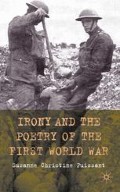Abstract
When the First World War finally ended with the Armistice on 11 November 1918, the nations involved had lost millions of citizens, of whom at least 744,000 were British and Irish soldiers (Harris, 2003, ch. 8). To this number must be added 14,661 merchant seamen and 1,117 civilians, and for the British Empire as a whole the number of deaths is approximately 947,000. This loss constituted ‘a fracture in time and space that separated the present from the past’ and consequently the war entered postwar consciousness as a ‘gap in history’ (Hynes, 1991, p. xiii), indicative of modern experience. Long before the Armistice, even before the end of the first year of the war, disillusionment had set in as it became obvious that the war would not be over before Christmas.
Access this chapter
Tax calculation will be finalised at checkout
Purchases are for personal use only
Preview
Unable to display preview. Download preview PDF.
Copyright information
© 2009 Susanne Christine Puissant
About this chapter
Cite this chapter
Puissant, S.C. (2009). Introduction. In: Irony and the Poetry of the First World War. Palgrave Macmillan, London. https://doi.org/10.1057/9780230234215_1
Download citation
DOI: https://doi.org/10.1057/9780230234215_1
Publisher Name: Palgrave Macmillan, London
Print ISBN: 978-1-349-36673-6
Online ISBN: 978-0-230-23421-5
eBook Packages: Palgrave Literature & Performing Arts CollectionLiterature, Cultural and Media Studies (R0)

